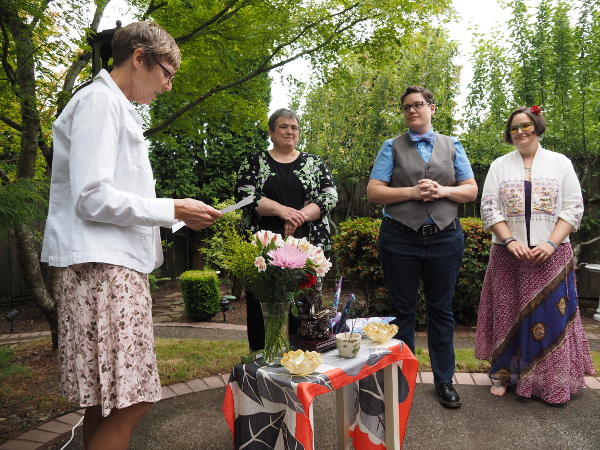Yesterday, nearly four years after our religious ceremony, Sherri and I became legally married. I am so incredibly happy and proud to be able to call Sherri my legal spouse, and me hers, with all the rights and responsibilities therein.

The ceremony was brief, at our home, with a few clothes friends and family members in attendance.
These are the words I spoke to Sherri:
Not quite 7 years ago, I set out for Portland to start a new part of my life. Someone, or something must have been aware of my plan, because I was guided to you shortly upon my arrival here.
Since then I have learned that you are one of the most generous, compassionate and courageous spirits I have ever met. From the beginning, you opened your heart wide to me and while cautious at first, I have learned to take great refuge in your presence.
As many here know, the last handful of years together has been difficult. But between the challenges we’ve faced, we’ve found space for joy, laughter, and delight. I would do everything all over again for the privileged of getting to build this life with you.
My vows to you:
Because our life together will not always be easy, I vow to meet challenges in our relationship with a sense of compassion and adventure.
Because our family is but one piece in a very large puzzle. I vow to live a life of service to you, to our marriage and to our community.
Because while love is not scarce, many resources are, I vow to make sure you always have the things you need most such as food, water, shelter and art supplies. I vow to utilize our resources wisely.
Because I want to spend the most amount of time possible with you and grow old together, I vow to care for my body and mind.
Because play is just as important as work, I vow to cultivate playfulness, laughter and lightness in our relationship.
Because what I was hiding, deep inside, you brought out into the light, and even thought it is terrifying at times, I vow to stand bravely in the light of your love.
My dearest Sherri, You are the first person who made me truly feel loved. I look forward to sharing a life of practice with you and I am truly honored that you are recognizing again this commitment with me here today, in front of our friends and family.
While I wish we didn’t have to wait at all to get legally married, I’m grateful we have been able to do so in our home state earlier than I had anticipated. I’m grateful for the opportunity affirm “yes, I know what these vows mean in practice and I continue to commit to every single one of them.”
The Ursula K Le Guin quote that Sherri sent out with our invitations says it all:
Love does not just sit there, like a stone; it had to be made, like bread, remade all the time, made new.
